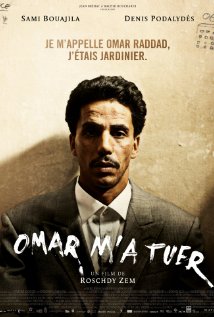
OMAR KILLED ME/OMAR M'A TUER
France, 2011, 85 minutes, Colour.
Sami Bouajila, Denis Podalydes.
Directed by Roschdy Zem.
Omar Killed Me is based on a true story, the story of a gardener from Morocco who had been in the South of France for six years and who is accused of murdering a local woman. One of the key pieces of evidence was that she had allegedly crawled and written on the wall of the basement in her blood, Omar Killed Me – the grammar was incorrect (tuer instead of tue).
Omar himself was the gardener, in France for six years, bonding with his parents, with wife and children, happy in his work, spoken well off by the neighbours. With the writing on the wall, Omar was initially convicted and sentenced to prison. However, his lawyer likened the situation to the Dreyfus case and the prejudice against North African migrants. The judges were harsh in their decisions – as they were much later when further appeals were made.
The film moves between the events of 1991 when the crime was committed and 1994 and later with Omar in jail and finally released. While the portrait of Omar is sympathetic, there is also a portrait of an established author, interested in justice, who decides that he should write a book about Omar and his case, something similar to Truman Capote and In Cold Blood. The author investigates, makes interviews, pointing out the holes in the evidence against Omar. While there is a modification in his sentence, Omar is not declared innocent and his case is ongoing.
Sami Bouajila is very good in the central role, rather stoic in his innocence, considering the impositions on him and Dennis Polydades is the author. The film was co-written and directed by prominent French actor, Roschdy Zem.
1. The film based on a true story? The accused in jail seven years? The French courts not allowing him to make the DNA comparison and appeal?
2. France in the 1990s, workers from North African countries, prejudice, presumptions against them?
3. The structure of the film, the crime and defence and trial in 1991, Omar in prison in 1994 and subsequent years?
4. The South of France, Nice, Toulon, homes, gardens, the streets, the courts, jail? Authentic atmosphere?
5. The title, the victim writing on the wall, in blood, in the dark, the poor grammar? Omar not being able to read or write? His innocence? His being framed – even to bad grammar? The irony that he could not write?
6. Omar, from Morocco, his bond with his father, his mother and visits to Morocco? His not being educated? In France, working in gardens, his love of gardens? His attitude towards the murdered woman? Considering her as a mother? His gambling habit, seeing him in the casinos, the slot machines, his losing? His motivation for his robbing the woman?
7. At home, wife and children, his parents, his community? The arrest, his mother and wife upset? In the car, at the police station, the harsh interrogations, presumptions of guilt?
8. The scenes in the courtroom, his needing a translator, the accusations, his family in court? The role of his defence counsel? With passion? His being found guilty, the sentence?
9. Omar going to jail, the procedures, going to his cell, the other men, watching the television and his court case, the noise during the night and his being disturbed? Seven years in jail?
10. The occupation in jail, his building the boat and his son, the family visits?
11. The author, his novels, his interest in the case, passion about justice, discussions with his family, their wanting him to be calm, discussions with his publisher? The decision to write the book? The comparison with Truman Capote in In Cold Blood? His being authorised to investigate?
12. His evidence, holes in the case against Omar, the different times, the neighbours, testifying in favour of Omar? The criticisms of the murdered woman and her personality? Mean, money?
13. His assistant, the hotel room, her work? The interrogations, going to the family apartment, interview with the family, interview with the maid, pretending to be from a magazine, her own behaviour, boyfriend? Her lies? Building up a case for innocence?
14. The discussions with the lawyer, his help? The discussions with Omar himself? The writing of the book, its publication? Omar with a copy, but finding it too difficult to read?
15. The appeals, the modification of the sentence? Omar coming out after seven years? Diffident, the effect of the seven years, meeting the press? At home, the neighbours putting on the party, giving the boat to his son, his weeping?
16. His meeting again with the prosecutors, the issues of DNA, their harsh attitudes? His plea? The author and his making advances? The lawyer and his continued passion?
17. The film and its making a case for Omar? The parallels with the Dreyfus case? The case still in abeyance at the time of the making of the film?